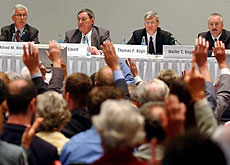Voters take law into own hands in 2006

In the pre-election year, the Swiss electorate have made good use of their right to make changes to the constitution through "people's initiatives".
Ten were launched in 2006 – the largest number for eight years, however well short of the record set in 1998 when 19 were tabled.
Experts were surprised by the large number of people’s initiatives set in motion this year, after the launch of only two in 2005. There was much talk at the time of “democracy fatigue”.
But they now believe the parliamentary elections scheduled for October 2007 may have rekindled interest.
The environmentalist and animal rights activist, Franz Weber, has launched two initiatives to stop unchecked property development and to put a cap on the number of second homes that can be built in tourist regions.
The centre-left Social Democrats are heading a campaign to put an end to what it calls “unfair tax competition”, in response to the introduction of degressive tax rates by several cantons in recent years.
These cantons have among the lowest corporate tax rates in the world, which has attracted multinational companies to set up holdings there. The issue has also led to a dispute between Switzerland and the European Union, which says it may contravene a 1972 Free Trade Agreement.
Rip-off mentality
The head of a small Swiss company is more concerned about what he deems excessive salaries earned by the top managers of Swiss companies.
Thomas Minder, the boss of the Trybol cosmetics firm in canton Schaffhausen, launched an initiative in October against this “rip-off mentality”.
He claims government plans to revise company laws do not go far enough and is also demanding an increase in shareholders’ rights.
Another individual, Pius Lischer, wants to see the income generated by the tax placed on tobacco and alcohol go to subsidising Switzerland’s health insurance, and a tax put on non-renewable energy sources in order to finance the country’s social insurance schemes.

More
People’s initiative
Animal rights
The leading Swiss animal-welfare group, Swiss Animal Protection (SAP), is campaigning for the introduction of legal representation for animals. According to SAP, animal rights groups are not granted a fair representation in legal cases.
Also of note, a leading pacifist organisation – Switzerland without an army – wants to see a total ban placed on the exports of war materials. It has until the end of this week to collect the 100,000 signatures needed to force a nationwide vote.
The organisation came to prominence in the late 1980s when it launched a people’s initiative to do away with the Swiss army. Although it lost the 1989 initiative at the ballot box, it won over more of the electorate than had been expected – 35.6 per cent.
The next initiative due to be voted on is the proposal for a single state-run health insurance company. Even though parliament and the government have already come out against the plan, voters will have the final say on March 11, 2007.
swissinfo with agencies

More
Direct democracy
May 21: 86% of voters approve education reform, to increase harmonisation among the cantons.
September 24: 68% of voters agreed with the government and decided to tighten asylum laws and further limit immigration. A third ballot – to prop up the country’s ailing old-age pension scheme with profits from the National Bank – failed.
November 26: 53% of voters said yes to a SFr1 billion ($800 million) payment to the ten new European Union member states and 68% approved a unified minimum child allowance.

In compliance with the JTI standards
More: SWI swissinfo.ch certified by the Journalism Trust Initiative











You can find an overview of ongoing debates with our journalists here . Please join us!
If you want to start a conversation about a topic raised in this article or want to report factual errors, email us at english@swissinfo.ch.